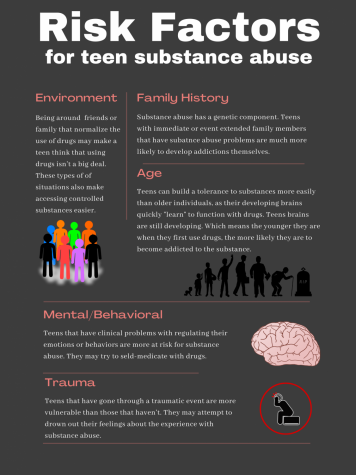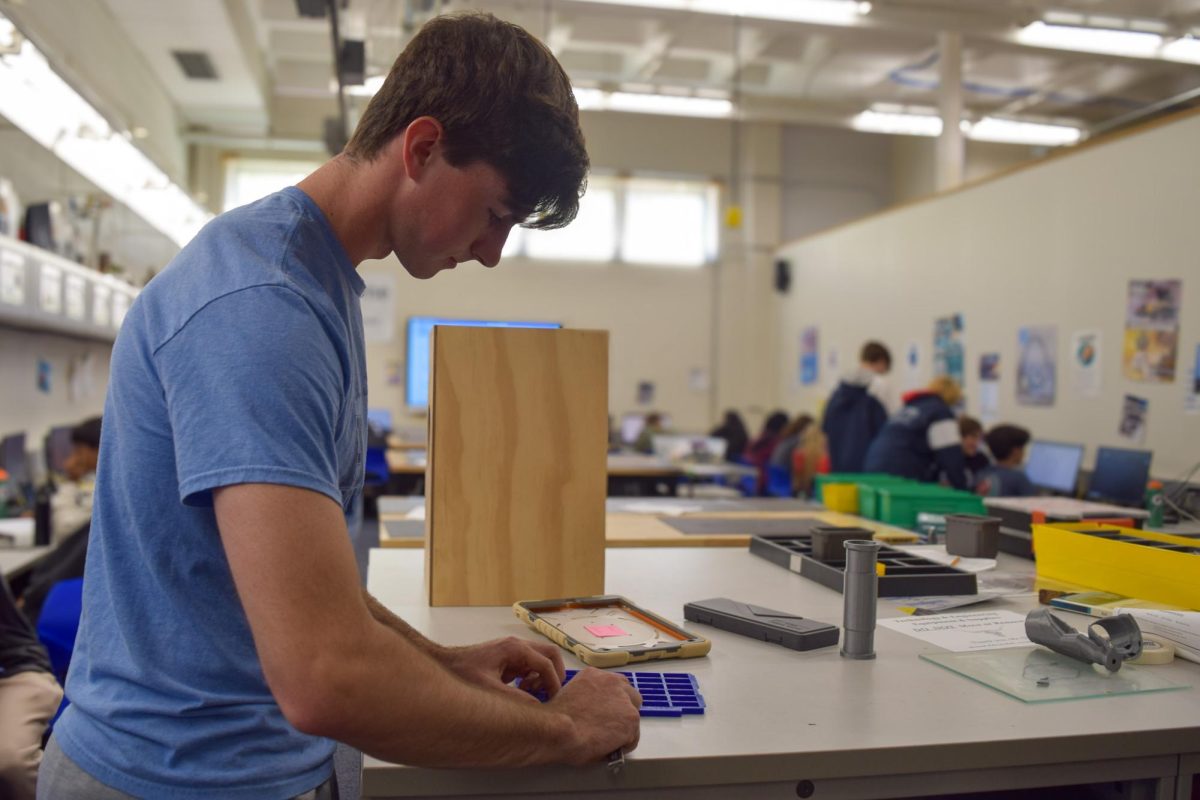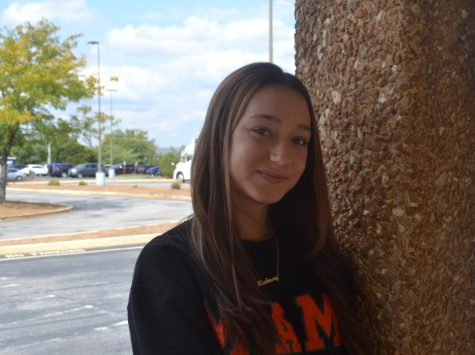Today marks day 575 of 2012 West graduate Trevor Shukers’ sobriety. After six years of drug abuse and struggling with mental illness, Shukers decided to get clean not only for himself but for his family. Shukers’ addiction began with alcohol and escalated to opiates from prescription painkillers.
“Before [addiction], I always felt like something was off with me. I couldn’t communicate normally and felt very socially awkward with people. I didn’t feel like I fit in with anyone. I could be sitting in a room with 50 people and still feel totally alone,” Shukers said. “The first time I drank alcohol, all of those feelings went away.”
Shukers’ first experience with alcohol brought him a feeling of social acceptance.
“When I first drank alcohol, I didn’t think, ‘I want to do this every day of my life.’ I just became aware of the feeling where I could be myself and be accepted,” Shukers said.
In Shukers’ junior year of high school, he experienced physical and emotional abuse from a traumatic event and was prescribed narcos. Shukers’ first experience with pain killers differed from alcohol.
“The first time I was prescribed pain killers it gave me the feeling alcohol did on the inside but significantly heightened. The way I thought of it was ‘ok I can walk around school and work and function on opioids, but I can’t do this from alcohol,’” Shukers said. “After my first time taking one, I was 100% hooked on it. Nothing had ever made me feel that way before. It made every bit of emotional pain I had ever gone through go away.”
When Shukers’ prescription ran out and narcotic accessibility and prices were an obstacle, Shukers struggled severely with his mental health for two years. Eventually, Shukers began to obtain similar drugs by his own means in an attempt to rid himself of his negative emotions.
“For about two years, I didn’t talk to anyone. I was isolated. I was extremely depressed. The thought of anything gave me panic attacks,” Shukers said. “I was fed up with those feelings, so I reached out to someone who I knew felt the same way and he didn’t have any pain killers, but he had fentanyl.”
Fentanyl is a highly addictive, powerful opioid drug used in the treatment of severe pain. At the time Shukers was unaware he had been given fentanyl, and his addiction quickly escalated to any types of pain pills he could get his hands on. After years of addiction, Shukers began to realize he was losing himself.
“In addiction, you don’t see the changes happening to yourself. It’s everyone around you. Looking back, I can see those differences that slowly unfolded,” Shukers said. “I had burned bridges with every single person that actually cared about me. My family still loved me just as much at the time, but given my mental health and well being they had to love me from a distance.”
Shukers rejected help and refused to accept his addiction.
“I started isolating even more. The only thing I cared about was drinking and drugging. That was my number one goal in life. I did not care about anyone. People slowly started asking me little questions about it. Every single day I would be gone two or three hours trying to get drugs, and people began asking me why I was gone. If anyone started suspecting I was using drugs, I just cut them out of my life,” Shukers said. “For a while, I was so ashamed of myself and I thought of myself as a functioning drug addict.”
In a six-day span, Shukers’ fiancée kicked him out of their house because she became aware of Shukers’ addiction. Shukers moved in with his parents and overdosed two times and was hospitalized.
“[Overdosing and being hospitalized] still wasn’t enough for me to want to get clean,” Shukers said. “I was lucky enough to survive that. Everyone in my family had actual proof I was a drug addict, and that still wasn’t enough for me.”
Shukers then tried to get clean for his family.
“I went to a rehab center and stayed clean only for 30 days after I left because I had tried stopping for someone else, not for myself. In order to get and stay clean, I had to look myself in the mirror and dive into the internal problems I had going on,” Shukers said.
Shukers believes that during that time, he met rock bottom and had nothing.
“To me, everyone’s rock bottom is different. It takes some type of rock bottom for you to actually want to get clean. Being hopeless and not having a choice is what it took for me,” Shukers said. “At that moment in time, I was truly convinced that if I didn’t actually make serious changes I was gonna have nobody. I didn’t even care about living, I didn’t value myself or my life.”
Five hundred and seventy-five days ago today, Shukers decided to turn his life around. Shukers credits his addiction to the person he is today.
“Even though I put my friends and family through absolute terror and chaos, all those choices made me who I am today,” Shukers said. “The person I am today, I never thought I would become. If I could change anything, I wish I would’ve asked for help when I was having issues. I’m sure if I told any of my teachers or my mom someone would have helped, but I was too ashamed to reach out and I also didn’t know how to talk about it.”
According to the National Survey on Drug Use and Health (NSDUH), 96% of people who are actively addicted to substances and not seeking help don’t believe they need to get treatment for help. The remaining 4% either felt they needed treatment but didn’t try to find it. Shukers advises current addicts to seek help.
“[Current addicts should] talk to someone, anyone. It’s important to value yourself,” Shukers said. “Feelings and emotions are all temporary. That fear and feeling that you are not worth is all temporary. Bad feelings will pass and become filled with good ones with a little work.”

Nearly 841,000 people have died since 1999 from a drug overdose. In 2019, 70,630 drug overdose deaths occurred in the United States. A new survey from DrugFree.org finds an estimated 17% of American high school students say they drink, smoke or use drugs during the school day. Shukers wishes schools did more to educate students about addiction and alcoholism.
“I wish schools would do more about these issues. So many people still think it’s not gonna happen to them, but it happens every day,” Shukers said. “People see someone begging for money on the street corner or living under the bridge, and that’s how people picture drug addicts. That’s not what drug addiction looks like when it starts. People need to be educated more on what drug addiction looks like and the importance of mental health.”
Shukers believes these issues go hand-in-hand with mental health and it’s important to reach out. Roughly 50% of individuals with severe mental disorders are affected by substance abuse.
“People also don’t take mental health seriously. People bully kids in school and think it’s all fun and games. People don’t know what’s going on in their heads. I wish that when I was having a lot of depression and anxiety, I would’ve talked about those issues with someone,” Shukers said.
As a father of two young girls, Shukers plans to use his experience to teach children the consequences of drug and alcohol use. He plans to ensure that his children know they are more susceptible to substance abuse, as it is genetic.
“I know I can’t watch my daughters every second of the rest of their lives. As they continue to get older, I’m going to be brutally honest with them so they know the effects of everything. I know everything I put my parents through and I don’t want to go through that. I don’t want to lose either of my kids to this disease,” Shukers said. “I know marijuana is very political and even though some people think it’s okay, that was not okay for me. I’m going to make sure my daughters know that. Alcoholism and addiction is genetic. It’s only fair for them to know this runs in our family, and we need to be careful of it.”
Shukers not only wants to share his experience with his daughters but also with others in hopes of preventing or ending addictions.
“If I had one wish, it would be to cure alcoholism and addiction permanently. It tears apart so many peoples’ families. I’ve lost several people to substance abuse and that’s something I wish no one had to ever experience,” Shukers said. “People need to know there is hope, there’s a better way to live. Since I made that decision for myself I’ve achieved things, gotten materialistic things, more than I ever had. I’ve gotten all of my family back. The worst days I’ve had since I’ve gotten sober are still better than the absolute best day I had drinking and using.”
Since recovery, Shukers feels empowered.
“If I can apply determination and all those things it took for me to turn my life around to my everyday life, there is no task too big,” Shukers said. “I am trying really hard to be present and not dwell on the future as much. But my number one goal is to just be a decent human. Which means being there for my kids. Being a partner. Helping others who are struggling. I just got engaged. We just put an offer in for a new house today. Now that I am sober, I feel I can accomplish anything.”


![Celebrating his one year sobriety mark, Trevor Shukers and his fiancée Courtney Jaboor smile with their two children: Hailee [6 years] and Sutton [20 months]. Hailee was diagnosed with autism in the middle of last year. “My three girls have all helped me find a purpose for life,” Shukers said. “I believe Hailee is part of God's reason for helping me and giving me another chance, she needs me. Little does she know I need her more than she needs me. The girls have given me a life better than I could have ever imagined.”](https://pwestpathfinder.com/wp-content/uploads/2021/09/IMG-5553-e1632769906996-675x900.jpg)
![Focused on providing exceptional service, sophomore Darsh Mahapatra carefully cleans the door of a customer’s car. Mahapatra has always believed his customers deserve nothing less than the best. “[If] they’re trusting us with their car and our service, then I am convinced that they deserve our 100 percent effort and beyond,” Mahapatra said.](https://pwestpathfinder.com/wp-content/uploads/2025/10/DSC_0018-1200x800.jpg)
![Sophomore Aleix Pi de Cabanyes Navarro (left) finishes up a soccer game while junior Ava Muench (right) warms up for cross country practice. The two came to Parkway West High School as exchange students for the 2025-2026 school year. “The goal for the [exchange] program is to provide opportunities for both Parkway students and our international exchange students to learn about other cultures, build connections and become confident, capable, curious and caring — Parkway’s Four C’s — in the process,” Exchange Program Lead Lauren Farrelly said.](https://pwestpathfinder.com/wp-content/uploads/2025/10/Feature-Photo-1200x800.png)

![Gazing across the stage, sophomore Alexis Monteleone performs in the school theater. The Monteleone family’s band “Monte and the Machine” has been releasing music since 2012, but Alexis started her own solo career in 2024 with the release of her first single, Crying Skies. “My whole family is very musical, [and I especially] love writing [songs with them],” Monteleone said.](https://pwestpathfinder.com/wp-content/uploads/2025/09/DSC7463-1200x798.jpg)
![Amid teaching a lesson to her AP Calculus BC class, Kristin Judd jokes alongside her students in their funny remarks. Judd has always enjoyed keeping the mood light in her classroom, along with on the volleyball court. “[I enjoy] that side talk where you see [or] overhear a conversation and chime in, or somebody says something funny,” Judd said.](https://pwestpathfinder.com/wp-content/uploads/2025/09/image-1200x730.jpg)
![Eyeing the ball, junior Ella McNeal poses for her commitment pictures at Clemson University. McNeal’s commitment comes after months of contact with top Division 1 soccer programs. “ It has taken a lot to get to where I am, but I know that [what] I've already been through is just the beginning, and I can't wait for what is to come,” McNeal said.](https://pwestpathfinder.com/wp-content/uploads/2025/09/IMG_4926-1200x900.jpeg)


![Senior Adam Zerega stands with senior Dexter Brooks by farm equipment. Zerega often worked with friends and family on his farm. “I've been able to go to my family's farm since I was born. I [spend] at least three weekends a month [on the farm], so I'm there all the time,” Zerega said.](https://pwestpathfinder.com/wp-content/uploads/2025/04/IMG_4872-1200x900.jpg)

![Leaning on the podium, superintendent Melissa Schneider speaks to Parkway journalism students during a press conference. Schneider joined Parkway in July after working in the Thompson School District in Colorado. “My plan [to bond with students] is to get things on my calendar as much as possible. For example, being in [classes] is very special to me. I am trying to be opportunistic [meeting] kids [and] being in [the school] buildings. I have all the sports schedules and the fine arts schedules on my calendar, so that when I'm available, I can get to them,” Schneider said.](https://pwestpathfinder.com/wp-content/uploads/2025/09/IMG_5425-1200x943.jpeg)

![Leaping through the air, senior Tyler Watts celebrates his first goal of the season, which put the Longhorns up 1-0 against the Lafayette Lancers. Watts decided to play soccer for West for his last year of high school and secured a spot on the varsity roster. “[Playing soccer for West] is something I had always dreamed of, but hadn’t really had a good opportunity to do until now. It’s [really] fun being out [on the field], and I’m glad I decided to join the team. It’s just all about having fun with the boys and enjoying what time we have left together,” Watts said.](https://pwestpathfinder.com/wp-content/uploads/2025/09/DSC_1951-1200x855.jpg)

![Junior Fiona Dye lifts weights in Strength and Conditioning. Now that the Trump administration has instituted policies such as AI deregulation, tariffs and university funding freezes, women may have to work twice as hard to get half as far. "[Trump] wants America to be more divided; he wants to inspire hatred in people,” feminist club member and junior Clara Lazarini said.](https://pwestpathfinder.com/wp-content/uploads/2025/05/Flag.png)
![As the Trump administration cracks down on immigration, it scapegoats many immigrants for the United States’ plights, precipitating a possible genocide. Sophomore Annabella Whiteley moved from the United Kingdom when she was eight. “It’s pretty scary because I’m on a visa. When my visa expires next year, I’m not sure what’s going to happen, especially with [immigration] policies up in the air, so it is a concern for my family,” Whiteley said.](https://pwestpathfinder.com/wp-content/uploads/2025/05/DSC_0077-7copy.jpg)
![Shifting global trade, President Donald Trump’s tariffs are raising concerns about economic stability for the U.S. and other countries alike. “[The tariffs are] going to pose a distinct challenge to the U.S. economy and a challenge to the global economy on the whole because it's going to greatly upset who trades with who and where resources and products are going to come from,” social studies teacher Melvin Trotier said.](https://pwestpathfinder.com/wp-content/uploads/2025/05/MDB_3456-1200x800.jpg)

![Pitching the ball on Apr. 14, senior Henry Wild and his team play against Belleville East. Wild was named scholar athlete of the year by St. Louis Post-Dispatch after maintaining a high cumulative GPA and staying involved with athletics for all of high school. “It’s an amazing honor. I feel very blessed to have the opportunity to represent my school [and] what [it] stands for,” Wild said.](https://pwestpathfinder.com/wp-content/uploads/2025/05/unnamed-6-1200x714.jpg)
![Red, white and blue, the American flag holds the values of our democracy. The fight that we once endured has returned, as student journalists and senior correspondents across the country are losing their voices due to government control. “[Are] the White House and [the] government limiting free speech [and] freedom of the press? Yes [they are],” chief communications officer of the Parkway School District and former journalist Elisa Tomich said.](https://pwestpathfinder.com/wp-content/uploads/2025/03/Untitled-design-14.jpg)

Ashley Drissell • Sep 30, 2021 at 11:38 am
Trevor, I am proud of you for sharing your brave story. My brother was one of the 841,000 who has died from opiate addiction. He was 22 years old and my only sibling. Your words about the affects of addiction are familiar. These were words that he said too. Sharing these stories will help young people like my brother understand and seek help. Thank you for that.
Laura Glenn • Sep 30, 2021 at 7:07 am
Proud former teacher of Trevor and all of his accomplishments. Keep up the good work!
Nancy Shukers • Sep 29, 2021 at 5:36 pm
Could not be more proud of you! Your honesty is a gift ❤️
Douglas Shukers • Sep 29, 2021 at 4:21 pm
I am Trevor uncle let me rephrase that I am Trevor proud uncle. He has both feet firmly on the ground, a great family and support system. I know what he has put everyone through and it wasn’t pretty but I knew once he got going the right way that every day is a battle for him but I also know how much his family loves him
Trevor has a beautiful family of his on now and his wife and kids give him that reason to keep taking the next step. I am very proud of him and what he has accomplished